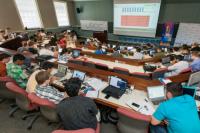-
Google Chrome vulnerability lets attackers steal movies, protected content
A security vulnerability in Google technology that is supposed to protect videos streamed via Google Chrome has been discovered by researchers from the Ben-Gurion University of the Negev Cyber Security Research Center (CSRC) in collaboration with a security researcher from Telekom Innovation Laboratories in Berlin, Germany. The vulnerability in the encryption technology, Widevine EME/CDM, opens an easy way for attackers to hijack protected content delivered via different popular streaming services, making the unprotected content available for illegal distribution.
-
-
Intelligence agencies spy on our data by manipulating computer chips
Researchers work to develop mechanisms that will render the Internet of Things more secure. They focus on a specific security gap: the manipulation of computer chips, that is, hardware components. These components can be found not only in PCs and laptops, but also in all other devices with integrated electronics; those include credit cards, cars, and smartphones, as well as large industrial facilities and medical equipment.
-
-
Cyber Guard 2016 aims to manage complexity in invisible domain
Between one million and ten million U.S. homes and businesses are without power. An oil spill from a near-shore refinery is gushing into the waters off Texas and Louisiana. The port of Los Angeles is shut down due to a network outage. Visitors to exercise Cyber Guard 2016 here viewed mock newscasts detailing these scenarios as examples of the likely effects of a massive cyberattack.
-
-
FBI's approach to digital investigations puts security at risk: Expert
A cybersecurity expert argues that the FBI’s recent and widely publicized efforts to compel Apple Computer to write software to unlock an iPhone used by a terrorist in California reflects an outdated approach to law enforcement that threatens to weaken the security of all smartphones, potentially putting the private information of millions of smartphone users at risk and undermining the growing use of smartphones as trusted authenticators for accessing online information.
-
-
Malware, data theft, scams: The risks of free livestreaming Web sites

Millions of people use free livestreaming websites to watch sports and other live events online, but this comes with a considerable security risk. Researchers have found that viewers are often exposed to malware infections, personal data theft, and scams. As much as 50 percent of the video overlay ads on free livestreaming websites are malicious.
-
-
Nation’s elite cybersecurity talent participate in U.S. Cyber Challenge program

A week from today, Illinois’ top cybersecurity talent will descend upon Moraine Valley Community College outside of Chicago to participate in the annual U.S. Cyber Challenge (USCC) Cyber Camp. During the week-long camp, individuals will participate in a variety of classes that cover such subjects as packet crafting and pen testing, and compete in a virtual Capture the Flag competition to demonstrate their cybersecurity abilities in a free-form environment in hopes of winning one of the limited (ISC)2 scholarship vouchers.
-
-
NIST to refine Cybersecurity Framework after comments from stakeholders
NIST is developing a minor update of its Cybersecurity Framework based on feedback from its users. In the just-released Cybersecurity Framework Feedback: What We Heard and Next Steps, NIST is announcing that a draft of the update will be published for comment in early 2017.
-
-
Terrorists gaining cyber capability to bring major cities to a standstill: U.K. intelligence chief
Robert Hannigan, the director of GCHQ, the British equivalent of the U.S. NSA, has warned that terrorists and rogue states are gaining the technical capability to bring a major city to a standstill with the click of a button. He said that the risk to cities like London would significantly increase as more physical objects – cars, household appliances — are connected online in what is called the Internet of Things.
-
-
Weak spots in Europe’s “Right to be Forgotten” data privacy law
Under Europe’s “Right to be Forgotten” law, citizens there can petition Internet search providers such as Google to remove search results linked to personal information that is negative or defamatory. In many cases, these links lead to information about accusations of criminal activity or financial difficulties, which may be “delisted” if the information is erroneous or no longer relevant. But “gone” doesn’t always mean “forgotten,” according to a new study.
-
-
Closing security gaps in the Internet of Things
Cars, fridges, household appliances – in the future, many everyday items will be online. This opens up numerous new targets for attacks. IT experts are developing protection mechanisms. The experts are developing a new method for detecting and fixing vulnerabilities in the applications run on different devices — regardless of the processor integrated in the respective device.
-
-
Electronic anti-theft systems pose a threat to cardiac device patients
Researchers say that electronic anti-theft systems still post a threat to cardiac device patients. Experts say that even though reported events are rare, prolonged exposure to electronic anti-theft systems, also called electronic article surveillance (EAS) systems, can cause pacing therapy to drop beats or in the worst case leave pacemaker dependent patients with no heartbeat, and cause ICDs to deliver inappropriate shocks.
-
-
Hackers could easily cause drones to ignore human controllers, or crash
Sales of drones — small flying machines equipped with cameras — are soaring. But new research by a computer security team has raised concerns about how easily hackers could cause these robotic devices to ignore their human controllers and land or, more drastically, crash. The researchers say that more secure flying devices are needed for aerial deliveries and photography.
-
-
You are not as anonymous online as you may think
Hiding online is harder than you would have thought. You may not be anonymous as you think you are online, reveals a new study. Your browsing behavior can indicate your personality and provide a unique digital signature which can identify you, sometimes after just 30-minutes of browsing.
-
-
HIPAA audits and what you need to consider to keep your organization compliant

HIPAA has long been a regulation which has been confusing, in many aspects requiring a legal degree to understand the complexity and exactly how to become and remain complaint.HIPAA was enacted in 1996, and it has taken twenty years for it to become the elephant in the room it is today.The regulation has become more sophisticated based on the overwhelming increase in data breaches with the medical industry experiencing the greatest impact.
-
-
Security risks in the age of smart homes

Smart homes, an aspect of the Internet of Things, offer the promise of improved energy efficiency and control over home security. Integrating various devices together can offer users easy programming of many devices around the home, including appliances, cameras and alarm sensors. There are great benefits to gain from smart homes, and the Internet of Things in general, that ultimately lead to an improved quality of living. However, given the security weaknesses in today’s systems, caution is appropriate.
-
More headlines
The long view
Ransomware Attacks: Death Threats, Endangered Patients and Millions of Dollars in Damages
A ransomware attack on Change Healthcare, a company that processes 15 billion health care transactions annually and deals with 1 in 3 patient records in the United States, is continuing to cause massive disruptions nearly three weeks later. The incident, which started on February 21, has been called the “most significant cyberattack on the U.S. health care system” by the American Hospital Association. It is just the latest example of an increasing trend.
Chinese Government Hackers Targeted Critics of China, U.S. Businesses and Politicians
An indictment was unsealed Monday charging seven nationals of the People’s Republic of China (PRC) with conspiracy to commit computer intrusions and conspiracy to commit wire fraud for their involvement in a PRC-based hacking group that spent approximately 14 years targeting U.S. and foreign critics, businesses, and political officials in furtherance of the PRC’s economic espionage and foreign intelligence objectives.
Autonomous Vehicle Technology Vulnerable to Road Object Spoofing and Vanishing Attacks
Researchers have demonstrated the potentially hazardous vulnerabilities associated with the technology called LiDAR, or Light Detection and Ranging, many autonomous vehicles use to navigate streets, roads and highways. The researchers have shown how to use lasers to fool LiDAR into “seeing” objects that are not present and missing those that are – deficiencies that can cause unwarranted and unsafe braking or collisions.
